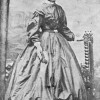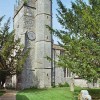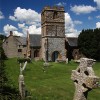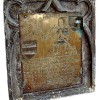On the night of the 18th of November 1806, five men assembled in a house at Corfe Castle where they blackened-up their faces and hands, disguised their clothes and armed themselves with bludgeons and a gun. At about one o’clock in the morning they broke into the home of 79 year-old Robert Nineham, a yeoman farmer and his son, and burst into their bedrooms and also the maid’s room, threatening them all with “instant death” if they did not lie still. They then proceeded to break open a bureau and several boxes and stole one hundred guineas in gold, bank notes to a value of seventeen pounds, a watch and a gun.
The house where they met was the home of Robert White and his wife Sarah and their children. Three of the other men lodged with White and were strangers to Purbeck. All the men worked on the railway being laid on a route from the clay pits to the sea.
The men were quickly apprehended and much of what was stolen was found still in their possession. Later they were brought before Sir T.M. Sutton a Judge sitting at Dorchester. The charge against them: “burglariously breaking and entering the dwelling house of Robert Nineham, of Hurpson in the Isle of Purbeck.” After a trial lasting five hours all five were convicted of the crime.
Robert White was the first son of William and Grace (nee Hinton) White who married at Corfe Castle on the 15th of February 1774. Robert was baptised on 17th of December 1775 and his siblings were: George (1777 who died in 1779); Martha (1779); George (1782); Mary (1784 who survived for only four months); Sarah (1785); Betty (1788); Mary (1790); John (1793) and Charles (1796). William White was buried on 13th of July 1820 at Corfe Castle aged 67 years surviving his wife; Grace, by three years; she was buried on 3rd of June 1817 and was also aged 67 years.
Robert married Sarah Keats on the 28th of August 1798 and their first child, a daughter (Jane), arrived four months later and was baptised on 23rd of December 1798. Their second child, another daughter named Mary Ann, was baptised on the 17th of August 1800, her short life ended in 1811. The first son, John, was baptised on 30th of September 1801 and another daughter, Harriet, was baptised on the 5th of August1802 but she died fifteen months later. Their younger boy, George, was baptised 26th of October 1804.
From this distance it is impossible to tell who the ring-leader was and if our Dorset son was led astray by visitors from other parts. It seems inconceivable though that his wife would not have known the errand he was on that night; but did she encourage him or attempt to dissuade him. He was bringing in a wage supplemented by whatever the three strangers paid him for lodging so it is unlikely the family was on the bread-line. If greed was the motivation he and his family paid a high price for his involvement in this venture.
According to reports at the time the Judge, in passing sentence of death on the men, did so “in the most impressive manner”. He pointed out to the men the great enormity of their crime and that it was all the more serious because of the aggravated circumstances they used.
Judge Sutton said “that in the interests of public justice and the security of private property he could not give them the least hope of mercy” and he entreated them to “employ the short time allotted them in this world by the most sincere penitence, in endeavouring to obtain pardon from that Almighty Being, in whose unfathomable wisdom mercy can be reconciled with justice”. At the time it was noted that the behaviour of the prisoners “during the time of their condemnation” was very penitent and it was said they acknowledged the justice of their sentence. As it happened two of the men, George Walker and Thomas Wright were “respited a few days before the execution”, which we take to mean they were granted a “stay of execution”.
Robert White, John Alexander (30) “of a good family and is unmarried” as also was Thomas Gibbons (27) were taken from their cells at about one o’clock to the place of execution being the New Drop, on the ledge of the castle at Dorchester, where on Saturday, March 28th, 1807 they were “launched into eternity”. They were the last men to be hanged in Dorset for house-breaking.
This story ends on a poignant note. Sometime in November of 1806 Robert White and his wife Sarah conceived another child who was born about five months after her father’s execution. She was named Caroline and baptised on the 23rd of August 1807. Her life was short, as she died in March 1820.



